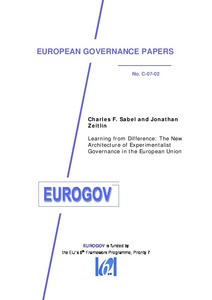Learning from difference: the new architecture of experimentalist governance in the European Union
"This paper argues that current widespread characterizations of EU governance as multi-level and networked overlook the emergent architecture of the Union’s public rule making. In this architecture, framework goals (such as full employment, social inclusion, “good water status”, a unified energ...
| Main Authors: | , , |
|---|---|
| Institution: | ETUI-European Trade Union Institute |
| Format: | TEXT |
| Language: | English |
| Published: |
Vienna
2007
Eurogov |
| Subjects: | |
| Online Access: | https://www.labourline.org/KENTIKA-19133371124919515539-Learning-from-difference-the-n.htm |
| Summary: | "This paper argues that current widespread characterizations of EU governance as multi-level and networked overlook the emergent architecture of the Union’s public rule making. In this architecture, framework goals (such as full employment, social inclusion, “good water status”, a unified energy grid) and measures for gauging their achievement are established by joint action of the member states and EU institutions. Lower-level units (such as national ministries or regulatory authorities and the actors with whom they collaborate) are given the freedom to advance these ends as they see fit. But in return for this autonomy, they must report regularly on their performance and participate in a peer review in which their results are compared with those pursuing other means to the same general ends. Finally, the framework goals, performance measures, and decision-making procedures themselves are periodically revised by the actors, including new participants whose views come to be seen as indispensable to full and fair deliberation. Though this architecture cannot be read off from neither Treaty provisions nor textbook accounts of the formal competences of EU institutions, the paper traces its emergence and diffusion across a wide range of policy domains, including telecommunications, energy, drug authorization, occupational health and safety, employment promotion, social inclusion, pensions, health care, environmental protection, food safety, maritime safety, financial services, competition policy, state aid, anti-discrimination policy and fundamental rights." |
|---|---|
| Physical Description: | 69 p. Digital |

